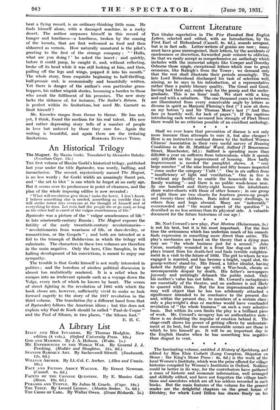Mr. Noel Coward's new play, Post Mortem (Heinemann, 5s.) is
not his best, but it is his most important. For the first time the seriousness which has underlain much of his comedy finds expression in something more direct than satire. The play's mechanics are based on the theory that a dying man may see " the whole business just for a second." John Cavan, mortally wounded in a front line dug-out in 1917, plays truant from his death-bed and finds terrible enlighten- ment in a visit to the future of 1930. The girl to whom he was engaged is married, and has become a bright, vapid slut, the gossip-writers' stand-by. His friend, a bitter idealist, having lashed the futility of the, age with a War-book, cheats an unconquerable despair by death. His father's newspapers joyously and untiringly debauch the public mind. Only his mother's value has not fallen. Mr. Coward's metaphysics are essentially of the theatre, and an audience is not likely to quarrel with them. But the less impressionable reader may well object that he has too arbitrarily attached a significance intended to be conclusive to the present day and, within the present day, to members of a certain class ; only a playwright's deus ex inachina would have vouchsafed revelation of the whole business " on such a very selective basis. But within its own limits the play is a brilliant piece of work. Mr. Coward's savagery ha's an authoritative note : there is no doubting the impulse of emotion behind it. The stage-craft shows his power of getting effects by understate- ment at its best, but the most memorable scenes are those in which he lets himself go. It will be an important day in the English theatre when he has something less negative than disgust to vent.
* * * *










































 Previous page
Previous page